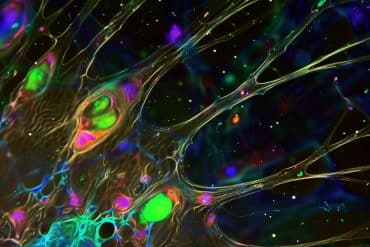Summary: People with Parkinson’s disease experience altered bodily sensations related to basic emotions differently from healthy individuals. Utilizing electronic body maps, participants identified how emotions like anger, happiness, and sadness manifested physically, noting significant shifts in sensation locations, particularly with anger moving from the chest to the abdomen.
These findings underscore the impact of non-motor symptoms on the quality of life in Parkinson’s patients and suggest that the autonomic nervous system’s dysfunction plays a key role. The study offers new insights into emotional processing in neurological disorders and could influence future treatments and research approaches.
Key Facts:
- Participants with Parkinson’s displayed altered physical sensations associated with basic emotions, with notable differences in how anger was experienced.
- The study highlights the significant role of non-motor symptoms, particularly emotional processing abnormalities, in affecting the quality of life for those with Parkinson’s.
- This research is pioneering in demonstrating emotion-related bodily sensation abnormalities in neurological disorders, potentially paving the way for innovative treatment strategies.
Source: University of Turku
Emotions have a major impact on the way we act, and they regulate our hormones and many of the body’s vital functions. Emotions can also be associated with strong physical reactions and sensations, such as an increase in heart rate and blood pressure when a berry picker encounters a bear in the woods or butterflies in the stomach when going on a first date.
Emotions are also reflected in the symptoms of many neurological and psychiatric disorders, with negative emotions in particular often increasing the symptoms of the disease.

Parkinson’s disease is a neurological movement disorder that is characterised by motor symptoms, such as slowness, stiffness, and tremor. Parkinson’s disease is also associated with a number of non-motor symptoms, such as depression, anxiety, and dysfunction of the autonomic nervous system.
Dysfunction of the autonomic nervous system has an influence, for example, on the blood circulation and gastrointestinal tract function.
Doctoral Researcher and physician specialising in neurology, MD Kalle Niemi and his colleagues investigated the bodily sensations of basic emotions (anger, disgust, fear, happiness, sadness, surprise, and neutral) in Finnish Parkinson’s disease patients.
The subjects were asked to identify their symptoms and bodily sensations associated with different emotions by drawing them on an electronic human body map using a computer mouse.
People with Parkinson’s disease were found to have significant differences in all bodily sensations related to basic emotions when compared with the control subjects. The differences were most pronounced in the bodily sensations of anger, which in healthy people are focused in the chest area.
In people with Parkinson’s disease, the bodily sensation of anger in the chest was reduced and seemed to shift more to the abdominal region as the disease progressed, consistent with the dysfunction of the autonomic nervous system associated with Parkinson’s disease.
“In recent years, there has been a growing realisation that the non-motor symptoms of Parkinson’s disease have a significant impact on the patients’ quality of life. The results of our study highlight yet another non-motor phenomenon,” says Niemi.
Emotional abnormalities are common in psychiatric disorders, but this study is the first to show abnormalities in the emotion-related bodily sensations in a neurological disorder. The results may open up new perspectives into the symptoms and possibly even treatment of symptoms in neurological disorders.
“The results of our study raise many interesting questions about the role of emotions in the symptoms of Parkinson’s disease. Extending our research method to other diseases offers new possibilities for neurology research,” summarises Juho Joutsa, Professor of Neurology at the University of Turku and principal investigator of the study.
About this Parkinson’s disease and body mapping research news
Author: Tuomas Koivula
Source: University of Turku
Contact:Tuomas Koivula – University of Turku
Image: The image is credited to Neuroscience News
Original Research: Open access.
“Bodily Maps of Symptoms and Emotions in Parkinson’s Disease” by Kalle Niemi et al. Movement Disorders
Abstract
Bodily Maps of Symptoms and Emotions in Parkinson’s Disease
Background
Emotions are reflected in bodily sensations, and these reflections are abnormal in psychiatric conditions. However, emotion-related bodily sensations have not been studied in neurological disorders.
Objective
The aim of this study was to investigate whether Parkinson’s disease (PD) is associated with altered bodily representations of emotions.
Methods
Symptoms and emotion-related sensations were investigated in 380 patients with PD and 79 control subjects, using a topographical self-report method, termed body sensation mapping. The bodily mapping data were analyzed with pixelwise generalized linear models and principal component analyses.
Results
Bodily maps of symptoms showed characteristic patterns of PD motor symptom distributions. Compared with control subjects, PD patients showed decreased parasternal sensation of anger, and longer PD symptom duration was associated with increased abdominal sensation of anger (PFWE < 0.05). The PD-related sensation patterns were abnormal across all basic emotions (P < 0.05).
Conclusions
The results demonstrate altered bodily maps of emotions in PD, providing novel insight into the nonmotor effects of PD.






